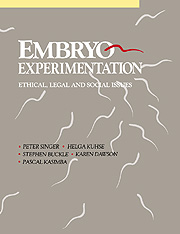Book contents
- Frontmatter
- Contents
- Foreword
- ACKNOWLEDGEMENTS
- INTRODUCTION
- PART 1 THE SCIENTIFIC ISSUES
- PART 2 THE ETHICAL ISSUES
- ARGUMENTS ABOUT THE STATUS OF DIFFERENT DEVELOPMENTAL STAGES
- ARGUMENTS FROM POTENTIAL
- EMBRYO RESEARCH AND WOMEN
- 10 Who is the subject of research?
- 11 Is IVF research a threat to women's autonomy?
- PART 3 CONTROLLING EMBRYO EXPERIMENTATION IN A DEMOCRATIC SOCIETY
- FORMING A PUBLIC POLICY
- LEGISLATION AND ITS PROBLEMS
- APPENDICES
- GLOSSARY
- NOTES ON CONTRIBUTORS
- INDEX
10 - Who is the subject of research?
Published online by Cambridge University Press: 05 June 2012
- Frontmatter
- Contents
- Foreword
- ACKNOWLEDGEMENTS
- INTRODUCTION
- PART 1 THE SCIENTIFIC ISSUES
- PART 2 THE ETHICAL ISSUES
- ARGUMENTS ABOUT THE STATUS OF DIFFERENT DEVELOPMENTAL STAGES
- ARGUMENTS FROM POTENTIAL
- EMBRYO RESEARCH AND WOMEN
- 10 Who is the subject of research?
- 11 Is IVF research a threat to women's autonomy?
- PART 3 CONTROLLING EMBRYO EXPERIMENTATION IN A DEMOCRATIC SOCIETY
- FORMING A PUBLIC POLICY
- LEGISLATION AND ITS PROBLEMS
- APPENDICES
- GLOSSARY
- NOTES ON CONTRIBUTORS
- INDEX
Summary
The debate over human embryo experimentation in recent years has centred on whether or not destructive embryo research is acceptable. In this debate, the meaning of the term ‘destructive experimentation’ is rarely specified: it is assumed to be clear. The debate has taken place in the context of a broader system of regulation of research on human subjects which distinguishes ‘therapeutic’ and ‘non-therapeutic’ experimentation from medical practice. Again, it is assumed that these distinctions are clear and well understood. In this paper we examine one of the difficulties of applying these concepts to in vitro human embryo research by asking the question: who is the subject of the research? We do not discuss the moral status of the embryo or the morality of embryo research. The question of who is the subject raises problems regardless of the moral status attributed to the embryo. We begin by examining the background concepts of therapeutic, nontherapeutic and destructive experimentation in medical practice and research on human subjects generally and the problems of applying these concepts to human embryo research.
The fields of medical practice and biomedical research, previously largely left to the control and concern of those working in them, have in recent years been regulated in two ways: ethical regulation and legislation. Ethical regulation of human experimentation (often referred to as ‘self-regulation’) developed from the principles enunciated after World War II by the Nuremberg court which tried German doctors for crimes against humanity.
- Type
- Chapter
- Information
- Embryo Experimentation , pp. 109 - 124Publisher: Cambridge University PressPrint publication year: 1990
- 4
- Cited by



